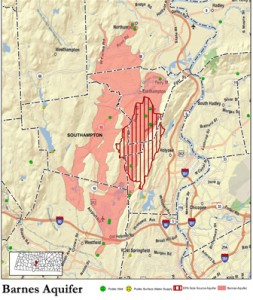WESTFIELD—Updates on the city’s water occurred in a couple of different meetings in the area yesterday.
Officials from the city attended meetings in Easthampton and Westfield, providing updates on the Granville Reservoir, as well as private well testing and other studies into the contamination issues that have caused concern for some residents. The meetings where the topics were discussed included the Barnes Aquifer Protective Advisory Committee (BAPAC) meeting in Easthampton and the Water Commission meeting in Westfield.
Regarding the Granville Reservoir, the latest reports appear to bode well for the water source.
“At this point, the reservoir is full,” Westfield Department of Public Works (DPW) Director Dave Billips said at the Water Commission meeting.
According to Heather Miller, water systems engineer for the city, the reservoir is currently 6 inches above the splashboards that were installed to increase volume, and those are a foot above the spillway.

A picture of the Granville reservoir on Nov. 14. The shore is expanded and clearly visible, showing obvious drought conditions. (WNG File Photo)
Billips said that the reservoir, if it were to be put back online, could be used until October but clarified that the conditions going forward will determine how full the reservoir remains for the city.
“It’s how the weather is going forward,” he said. “We’re still in a drought condition and that may change soon, but it’s how dry the weather is going forward. If it gets dry we’ll have the same problem.”
Miller added that work has already started getting the reservoir’s treatment plant back online, which would allow the city to use the reservoir as a water source again at some point soon.
For private well testing, Miller said at the BAPAC meeting that the Westfield Water Department is currently compiling a list of private wells and the Massachusetts Department of Environmental Protection (MassDEP) is reportedly ready for their next steps.
“MassDEP is ready to move forward with public notice and testing,” Miller said.
Private well testing was called upon by MassDEP following the concerns with the contamination of perfluorinated chemicals (PFCs) in the city’s public drinking supply. The testing is initially aimed at certain geographic areas around the Barnes aquifer, with select private wells being chosen for testing.
Miller said later at the Water Commission meeting that the testing that MassDEP is doing is in a “phased approach.” If in the first phase test results come back with elevated amounts of PFAS in those select private wells, then additional testing will occur during a second phase.
Additionally, if the test results come back with a total amount of PFCs over 70 parts per trillion—the lifetime health advisory level previously provided by the Environmental Protection Agency (EPA)—then Miller said MassDEP would provide bottled water in the short-term to those affected, with a possibility for filtration systems in the longer term.
Miller also said that testing on the public supply is moving forward, with collaboration coming from both MassDEP and the Air National Guard.
“The Guard is apparently finalizing plan and once I get that we can release that,” Miller said at the BAPAC meeting.



